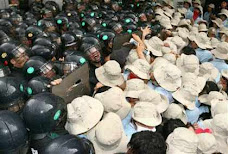
Has Georgia Overreached in Ossetia?
By Tony Karon
The victims, of course, are the civilians of Georgia and its breakaway South Ossetia region, caught in the escalating battle between the Georgian military and South Ossetian separatists and their more powerful Russian backer. Hundreds are alleged to have been killed in two days of heavy fighting that has shown no sign of abating by late Saturday, and thousands more are confronting the resulting humanitarian crisis. But the battle that began to rage in Georgia as world leaders were treated to the pyrotechnics of the Beijing Olympics' opening ceremony may be the most serious challenge to the post-Cold War balance of power since the collapse of the Soviet Union.
Georgia and South Ossetia have been squared off in an uneasy peace for more than a decade, now, since the region broke away from Georgia in the early '90s, following its independence from the Soviet Union. After a protracted war that killed around 1,000 people and displaced thousands more ethnic Georgians from the territory, Georgia was compelled to sign a cease-fire agreement that left South Ossetia — a tiny mountainous territory a few football fields smaller than Rhode Island — effectively autonomous, but unable to secure recognition by the international community. Still, Russia has protected the region, providing finance, military protection and even passports, and has used South Ossetia's secession, together with that of Abkhazia, another breakaway region of Georgia, as leverage against Tblisi's desire to join NATO. Moscow sees Georgia's move towards NATO as part of a strategy of hostile encirclement of Russia by Western powers, and when the Western alliance enabled Kosovo's secession from Serbia earlier this year despite the fact that its independence is not recognized by the United Nations, many analysts expected Russia to retaliate by further stoking the fires of secession in Georgia.
The victims, of course, are the civilians of Georgia and its breakaway South Ossetia region, caught in the escalating battle between the Georgian military and South Ossetian separatists and their more powerful Russian backer. Hundreds are alleged to have been killed in two days of heavy fighting that has shown no sign of abating by late Saturday, and thousands more are confronting the resulting humanitarian crisis. But the battle that began to rage in Georgia as world leaders were treated to the pyrotechnics of the Beijing Olympics' opening ceremony may be the most serious challenge to the post-Cold War balance of power since the collapse of the Soviet Union.
Georgia and South Ossetia have been squared off in an uneasy peace for more than a decade, now, since the region broke away from Georgia in the early '90s, following its independence from the Soviet Union. After a protracted war that killed around 1,000 people and displaced thousands more ethnic Georgians from the territory, Georgia was compelled to sign a cease-fire agreement that left South Ossetia — a tiny mountainous territory a few football fields smaller than Rhode Island — effectively autonomous, but unable to secure recognition by the international community. Still, Russia has protected the region, providing finance, military protection and even passports, and has used South Ossetia's secession, together with that of Abkhazia, another breakaway region of Georgia, as leverage against Tblisi's desire to join NATO. Moscow sees Georgia's move towards NATO as part of a strategy of hostile encirclement of Russia by Western powers, and when the Western alliance enabled Kosovo's secession from Serbia earlier this year despite the fact that its independence is not recognized by the United Nations, many analysts expected Russia to retaliate by further stoking the fires of secession in Georgia.































No hay comentarios:
Publicar un comentario